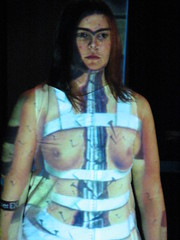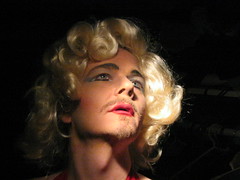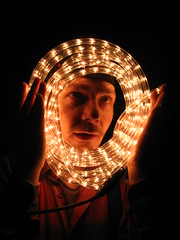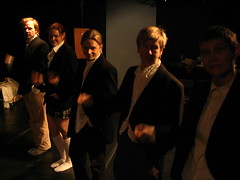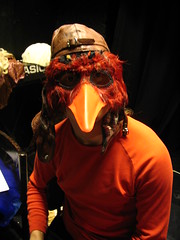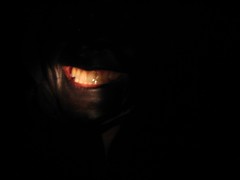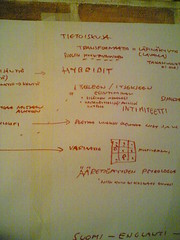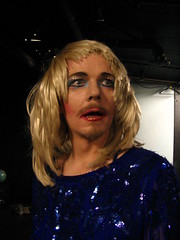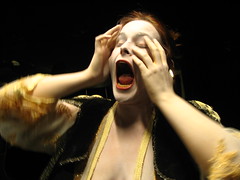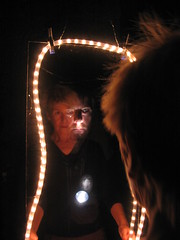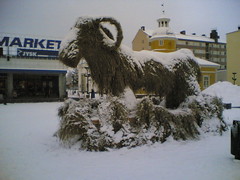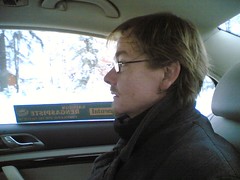I'm flying back to Canada for Christmas; I can't wait to finally meet my niece and see everyone I haven't seen for two and a half years. Just a couple more rehearsals before I go, of course. Stuff I'd like to expand on:
The Projects
Today's rehearsal is for Kalevala dell'Arte, mixing the Finnish epic with the Commedia dell'Arte style. The poetry is beautiful but none of us has a very rigorous approach to poetry (with my Shakespeare background, I seem to be the poetic text expert in the group and that's scary since I'm a total tenderfoot in the field). A few of us have a strong-ish background in Commedia, so that's at least a start. We have a musician, a dancer/choreographer, an acrobat, and a bunch of mask actors. So basically it's ambitious as hell and the training is daunting, but it could be a real hit.
Here speaks Elektra continues in the new year. We had a good discussion about why this particular last workshop segment was so difficult and painful when we all like the project and we all like working with each other. In some ways the content is responsible; you can't do a piece about torture and humiliation and expect it to have no effect on your mood whatsoever. Also we're working very personally and we keep finding that we distance ourselves from the work rather automatically, as a kind of protection. It's very frustrating to watch yourself shut down creatively in order to avoid some discomfort--you can really see it happening and have no idea how to not do it. I'm taking this as material; as a phenomenon that should be worked into the performance itself.
And then Akseli and Juha and I met on Sunday to discuss our upcoming project, with the working title Katsoin kun sinä katosit / I watched you disappear, which, if it happens in front of an audience, will happen next fall. The basic idea is for the three of us to work without a director. We have a common experience, we three, of things like butoh, biomechanics, modern dance, improvisation, and working with directors like Eero-Tapio Vuori, Atro Kahiluoto, Davide Giovanzana, Jani-Petteri Olkkonen, and choreographer Ken Mai. In a sense, their work has a unique combination in us, even though the directors themselves have little to no common artistic dialogue. And we want to crystallise what it is, exactly, that we know. How, exactly, we work as a group of actors, analysing what we have in common without having anyone else come in with new styles or ideas. To begin with, we're just planning workshops where we each take responsibility for a method/style/question and work with it for a couple of hours, and then another one takes a couple of hours, and after a few sessions we can say "I want to combine what you did with this exercise I did the other day and see what happens," and that's our beginning. We also have lots of general interest questions, from application of Laban's movement theories to the relationship between concentration in the actor and concentration in the audience, and the relationship between control and non-control between the performer and the performance. I mean, that's a start. I'm also interested in how people start to "become" each other when they work together a lot or hang out a lot or whatever. So that, in a nutshell of a nutshell, is the starting point for a project. We start training and research in January.
But first, it's back home for a bit of turkey and TLC!
Tuesday, December 12, 2006
Monday, December 04, 2006
You're projecting, Frida
Careful what you ask for as an actor.
I mean, of course yeah careful what you as for as a human being, but anyway and but so. I was getting driven round the bend by the fact that I've been playing with Hamletmaschine for three years in a more than just casual fashion; it's a like 10-page script, and still I think I'm not much closer than I was at the beginning to figuring out what it's about. So last night I sat down and tried to think through what the question is. What's the problem, the experiment at the heart of Hamletmaschine, but also the rest of the work we're doing on Elektra, which so far includes:
And like a whole bunch of other things too. But I started wondering what exactly is the question we're looking for, the problem that we can try to solve. The point for me isn't to solve the problem, but to work with it and deepen our understanding of it as well as the audience's understanding. As in, if you make a show about rape, it's not so interesting to me to shock the audience, upset them or any of those things for their own sake (or even to show rape on stage), but you should be studying the phenomenon and its underlying societal assumptions/consequences and working for a deeper understanding, which to me is worth going to the theatre for. For our work I rather liked the question How much can you take? as in What exactly can you tolerate?
Can anyone say they know exactly what they will and will not tolerate? Is there a difference between tolerate and condone? If you were aware of all the daily things that happen that you would classify as intolerable and still you let them go by without blinking an eye, would that drive you crazy? Hamlets and Ophelias, in Müller's text, do pretty much just that. But it is a good question: how much are you willing to put up with? To yourself and to others? And do you really want to know exactly what you ARE putting up with right now? When something is intolerable, what do you do? Do you do nothing? Why do you do nothing? Maybe you can take more pain, injustice, and humiliation than you would really like to think.
So anyway I ended up writing this text (it basically looks like much of the above, only about ten times as long), which was just a free-for-all on the idea of tolerating, and it went over pretty well at rehearsal today. I'm happy because it relates directly to the text (although it's not the only thing you'll find there by any means), but it is also easily transferable to our physical work, because we are pushing each other to many different limits, either in exertion, or discomfort, or humiliation, which means we're all really really really good friends now, us. But so anyway I read the text out loud and Davide says "That's really nice. Can you memorize it for Wednesday?" Hell, that's 72 hours or something like that. Sure. God, it's long.
Process is a good thing, plus projecting stuff
So now we're starting to get into a pattern for our work, which is good. This time we work usually six hours, sometimes four.
First we have about 30 minutes physical warmup (running and a particular viewpoints running exercise, then enough stretching to get everything ready to work), then about a half hour rhythm exercise I developed out of a biomechanics training.
In the exercise you start by moving by yourself, making an audible rhythm with your movement on the floor by hitting with your feet and hands, trying to put your weight on feet and hands with equal frequency which means lots of cartwheely stuff (or more like trying-to-do-cartwheely stuff). Once you have your rhythm, you can play with it. Then someone gets on a drum and beats out something very, very simple. Spend about five minutes just moving to and around this rhythm, embellishing it and playing with sub-phrases in the basic rhythm but getting it into your system. Then the drum stops and the task is now, as a group, to continue the rhythm and only the rhythm, so you make noise when you hit the floor, but you only make noise where the basic rhythm is. This limitation is quite challenging for the first 3 or 4 times. Now we're getting the hang of it, so we're going to be adding more limitations and variations (kinds of movement, more emphasis on the hands than feet, silence and rhythm, using partners) to keep it pushing forward.
After that hour, Davide leads another hour of vocal work, usually starting with an exercise to acquaint yourself with 7 resonators (they correspond to 7 chakras; although in English theatre training I'm used to working with 6 resonator sounds and the seventh one is a really, really French swallowed-nasal cross between "ah" and "uh" so I kind of privately call this the French vocal warmup), followed by a period of working with improvised sound and movement. Then there's this exercise Davide invented; we call it the aquarium, and let's just say for now that it's also improvised sound and movement, but with a heavy emphasis on body part isolation and articulation, i.e. mime skills. So after the first two hours we've gotten pretty sweaty and are throwing around our bodies and voices pretty freely. It's wonderful, though, to repeat the same exercises over and over and watch the work deepen so quickly. Breakthroughs at this point are fast and furious, and that feels really, really good.
The next two to four hours are material-building. Today Virpi brought in the photos, and we worked with projecting them on a screen (hm), then on white costumes (hm), and then finally Akseli said it should really just be naked skin, and all of a sudden the images look like we might be able to use them. I mean, they're images of torture, of humiliation, they're news images. They're really awful, and whenever we've tried to work with them the actors just get completely upstaged and it's so heavy-handed. But projecting Abu Ghraib images on skin has some potential. Somehow referring to the body so strongly opens the images up; it brings some new quality to the body and to the image, and that could be strong. Plus if you're wearing a projection, you feel like you're sorta wearing something, but in a pleasing kind of naughty way.
And then, after closing the slideshow, the old theatre computer's screen saver came on: this image of Frida Kahlo's Broken Column. Akseli was standing in front of it, and all of a sudden he stepped to the place where his face and Frida's face were merging into one face, and it was mesmerizing. So we may have found something else that will work, thank you Frida.
I mean, of course yeah careful what you as for as a human being, but anyway and but so. I was getting driven round the bend by the fact that I've been playing with Hamletmaschine for three years in a more than just casual fashion; it's a like 10-page script, and still I think I'm not much closer than I was at the beginning to figuring out what it's about. So last night I sat down and tried to think through what the question is. What's the problem, the experiment at the heart of Hamletmaschine, but also the rest of the work we're doing on Elektra, which so far includes:
- [Meyerhold's] Biomechanics training (me)
- Mask/Mime/Puppets/Objects (Davide)
- Dance/Choreography (Juha's choreography)
- Singing/Music/Rhythm/Vocal sound
- Tableaux
- Heiner Müller's text
- Ancient chorus, based on Lecoq training (Davide)
- Ofeliakone/Opheliamachine
- Humiliation
- Dominant/Dominated
- The Spanish Tragicomedy [Commedia dell'Arte precursor]
- Spontaneous performance art
- Video projections
- Torture
And like a whole bunch of other things too. But I started wondering what exactly is the question we're looking for, the problem that we can try to solve. The point for me isn't to solve the problem, but to work with it and deepen our understanding of it as well as the audience's understanding. As in, if you make a show about rape, it's not so interesting to me to shock the audience, upset them or any of those things for their own sake (or even to show rape on stage), but you should be studying the phenomenon and its underlying societal assumptions/consequences and working for a deeper understanding, which to me is worth going to the theatre for. For our work I rather liked the question How much can you take? as in What exactly can you tolerate?
Can anyone say they know exactly what they will and will not tolerate? Is there a difference between tolerate and condone? If you were aware of all the daily things that happen that you would classify as intolerable and still you let them go by without blinking an eye, would that drive you crazy? Hamlets and Ophelias, in Müller's text, do pretty much just that. But it is a good question: how much are you willing to put up with? To yourself and to others? And do you really want to know exactly what you ARE putting up with right now? When something is intolerable, what do you do? Do you do nothing? Why do you do nothing? Maybe you can take more pain, injustice, and humiliation than you would really like to think.
So anyway I ended up writing this text (it basically looks like much of the above, only about ten times as long), which was just a free-for-all on the idea of tolerating, and it went over pretty well at rehearsal today. I'm happy because it relates directly to the text (although it's not the only thing you'll find there by any means), but it is also easily transferable to our physical work, because we are pushing each other to many different limits, either in exertion, or discomfort, or humiliation, which means we're all really really really good friends now, us. But so anyway I read the text out loud and Davide says "That's really nice. Can you memorize it for Wednesday?" Hell, that's 72 hours or something like that. Sure. God, it's long.
Process is a good thing, plus projecting stuff
So now we're starting to get into a pattern for our work, which is good. This time we work usually six hours, sometimes four.
First we have about 30 minutes physical warmup (running and a particular viewpoints running exercise, then enough stretching to get everything ready to work), then about a half hour rhythm exercise I developed out of a biomechanics training.
In the exercise you start by moving by yourself, making an audible rhythm with your movement on the floor by hitting with your feet and hands, trying to put your weight on feet and hands with equal frequency which means lots of cartwheely stuff (or more like trying-to-do-cartwheely stuff). Once you have your rhythm, you can play with it. Then someone gets on a drum and beats out something very, very simple. Spend about five minutes just moving to and around this rhythm, embellishing it and playing with sub-phrases in the basic rhythm but getting it into your system. Then the drum stops and the task is now, as a group, to continue the rhythm and only the rhythm, so you make noise when you hit the floor, but you only make noise where the basic rhythm is. This limitation is quite challenging for the first 3 or 4 times. Now we're getting the hang of it, so we're going to be adding more limitations and variations (kinds of movement, more emphasis on the hands than feet, silence and rhythm, using partners) to keep it pushing forward.
After that hour, Davide leads another hour of vocal work, usually starting with an exercise to acquaint yourself with 7 resonators (they correspond to 7 chakras; although in English theatre training I'm used to working with 6 resonator sounds and the seventh one is a really, really French swallowed-nasal cross between "ah" and "uh" so I kind of privately call this the French vocal warmup), followed by a period of working with improvised sound and movement. Then there's this exercise Davide invented; we call it the aquarium, and let's just say for now that it's also improvised sound and movement, but with a heavy emphasis on body part isolation and articulation, i.e. mime skills. So after the first two hours we've gotten pretty sweaty and are throwing around our bodies and voices pretty freely. It's wonderful, though, to repeat the same exercises over and over and watch the work deepen so quickly. Breakthroughs at this point are fast and furious, and that feels really, really good.
The next two to four hours are material-building. Today Virpi brought in the photos, and we worked with projecting them on a screen (hm), then on white costumes (hm), and then finally Akseli said it should really just be naked skin, and all of a sudden the images look like we might be able to use them. I mean, they're images of torture, of humiliation, they're news images. They're really awful, and whenever we've tried to work with them the actors just get completely upstaged and it's so heavy-handed. But projecting Abu Ghraib images on skin has some potential. Somehow referring to the body so strongly opens the images up; it brings some new quality to the body and to the image, and that could be strong. Plus if you're wearing a projection, you feel like you're sorta wearing something, but in a pleasing kind of naughty way.
And then, after closing the slideshow, the old theatre computer's screen saver came on: this image of Frida Kahlo's Broken Column. Akseli was standing in front of it, and all of a sudden he stepped to the place where his face and Frida's face were merging into one face, and it was mesmerizing. So we may have found something else that will work, thank you Frida.
Labels:
davide,
devising,
here speaks elektra,
lecoq,
naamio ja höyhen,
rehearsal,
theatre,
training,
workshop
Wednesday, November 29, 2006
Here speaks Elektra, vol.II
Today's fun and games is the second round of workshops for Here speaks Elektra, an upcoming project at Naamio ja Höyhen with myself, Akseli Aittomäki and Juha Sääski on stage; Davide Giovanzana directing, and also including Virpi Byring, Maura Korhonen, and other designers in the mix; we haven't worked with everyone yet. It's an extension of the work we did for Opheliamachine way back in 2005, which means that it's based on ancient Greek chorus and Heiner Müller's Die Hamletmaschine, and this time we've shrunk the chorus and are looking more at the fifth act of HM; which begins with the line "Hier spricht Elektra." We've been focusing on ideas such as humiliation, torture, domination, and all kinds of stuff that makes you feel good at the end of the day.
Here's probably the most disturbing character I've ever met: Juha as Hamlet (as from die Hamletmaschine) who wants to be a woman. We just did some solo and duo work today with Davide, and my Ophelia/Gertrude had a hell of a time dealing with this bastard. Or rather, the disturbance was as much from O/G's inability to fight back as much as any aggression from Hamlet. Hamlet, in HM, wants to be a woman. An interpretation of this could be that he's systematically trying to rid himself of the parts that cause aggression, fighting, evil, and suffering. He ends up wanting to be a machine, with no pain, no thoughts. So we first had a fantastic dance from Juha here, alternating between war-waging, all-fucking movements and the delicate dance of a tragic lady Blanche. It was great; when he was masculine, I saw a man dressed in a woman's clothes. When he played feminine, I saw a woman dressed in a man's body. The clothes, I'm beginning to think, are a terribly important factor in an actor's (a person's?) psychology.
In Hamletmachine, Hamlet rapes his mother in a particularly brutal bunch of lines in the first act; or rather he talks about it but whether or not he actually does it is a matter of direction. He's little more than the embodiment of an uncontrollable violent urge, which is something I understood better after improvising with him today. And to me, Ophelia and Gertrude don't have physical power. It's just not part of my imagination of them. I've also never played a character who really couldn't just punch anybody's lights out (at least in a play where that kind of situation arises), so after improvising and basically having my character mocked and thrown about and mimed-violated, having no idea in my head at all where my supposed maternal/feminine power was supposed to be coming from and whether or not it could possibly hold any currency whatsoever against a Hamlet in this mood, I felt really distressed.
I've often been one of those actors who makes fun of actors who talk about their feelings a lot, but if you're a performer, you do work with them very closely from time to time and you do need to take your emotional responses seriously. You have to be able to step back and realize that you're not psychotic, depressed, angry, or a sex maniac, but your character is, and there is a difference. Sometimes it's easy to confuse your personality with a fantasy you've created. This is why some actors are (famously, almost cliched in a way) nervous wrecks.
The distress I felt comes not from anything that happened to me in the improvisation, but from some kind of weird empathy; the possibility that that situation could exist. Maybe not even for me, but for some woman (or man) somewhere. All the same, we experience emotions as if that thing has happened to us; we don't have any way of separating character-induced emotions from real life emotions, save the faculty to step back and analyse which one is which. The feeling of absolute powerlessness is very, very bad. It's also a very easy starting point for beautiful expression, because you simply cannot do anything, you have no effect on anyone, and the expression comes so easily because it cannot try to do or be anything other than itself. Loaded with powerlessness, a gesture can be wonderful.
What will be nice in the future is to see how Ophelia/Gertrude will turn this around, how the same powerless character will be able to hold all the cards over psycho-Hamlet. I'm not exactly sure how this is going to work, but I'm sure it should happen. She has something Hamlet will never have, and Hamlet wants that something.
Here's probably the most disturbing character I've ever met: Juha as Hamlet (as from die Hamletmaschine) who wants to be a woman. We just did some solo and duo work today with Davide, and my Ophelia/Gertrude had a hell of a time dealing with this bastard. Or rather, the disturbance was as much from O/G's inability to fight back as much as any aggression from Hamlet. Hamlet, in HM, wants to be a woman. An interpretation of this could be that he's systematically trying to rid himself of the parts that cause aggression, fighting, evil, and suffering. He ends up wanting to be a machine, with no pain, no thoughts. So we first had a fantastic dance from Juha here, alternating between war-waging, all-fucking movements and the delicate dance of a tragic lady Blanche. It was great; when he was masculine, I saw a man dressed in a woman's clothes. When he played feminine, I saw a woman dressed in a man's body. The clothes, I'm beginning to think, are a terribly important factor in an actor's (a person's?) psychology.
In Hamletmachine, Hamlet rapes his mother in a particularly brutal bunch of lines in the first act; or rather he talks about it but whether or not he actually does it is a matter of direction. He's little more than the embodiment of an uncontrollable violent urge, which is something I understood better after improvising with him today. And to me, Ophelia and Gertrude don't have physical power. It's just not part of my imagination of them. I've also never played a character who really couldn't just punch anybody's lights out (at least in a play where that kind of situation arises), so after improvising and basically having my character mocked and thrown about and mimed-violated, having no idea in my head at all where my supposed maternal/feminine power was supposed to be coming from and whether or not it could possibly hold any currency whatsoever against a Hamlet in this mood, I felt really distressed.
I've often been one of those actors who makes fun of actors who talk about their feelings a lot, but if you're a performer, you do work with them very closely from time to time and you do need to take your emotional responses seriously. You have to be able to step back and realize that you're not psychotic, depressed, angry, or a sex maniac, but your character is, and there is a difference. Sometimes it's easy to confuse your personality with a fantasy you've created. This is why some actors are (famously, almost cliched in a way) nervous wrecks.
The distress I felt comes not from anything that happened to me in the improvisation, but from some kind of weird empathy; the possibility that that situation could exist. Maybe not even for me, but for some woman (or man) somewhere. All the same, we experience emotions as if that thing has happened to us; we don't have any way of separating character-induced emotions from real life emotions, save the faculty to step back and analyse which one is which. The feeling of absolute powerlessness is very, very bad. It's also a very easy starting point for beautiful expression, because you simply cannot do anything, you have no effect on anyone, and the expression comes so easily because it cannot try to do or be anything other than itself. Loaded with powerlessness, a gesture can be wonderful.
What will be nice in the future is to see how Ophelia/Gertrude will turn this around, how the same powerless character will be able to hold all the cards over psycho-Hamlet. I'm not exactly sure how this is going to work, but I'm sure it should happen. She has something Hamlet will never have, and Hamlet wants that something.
Labels:
davide,
devising,
here speaks elektra,
juha,
naamio ja höyhen,
perversity,
rehearsal,
theatre
Wednesday, November 22, 2006
Ei käy!
This was just too good. I love Finland:
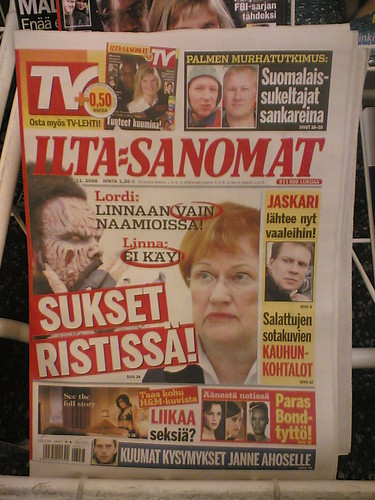
Lordi, invited to the annual presidential ball (a televised event watched by almost everyone who isn't invited--you pick your channel based on how you like your commentary, much like Eurovision), says they'll only go in masks.
Tarja Halonen: Ei käy!, which you can figure out what that means by the look on her mug. Go äiti Tarja!
Actually, a literal translation would be more fun:
SKIS CROSSED!
Lordi: To the castle in masks only!
Castle: No way!
How does it get more Finnish than this?

Lordi, invited to the annual presidential ball (a televised event watched by almost everyone who isn't invited--you pick your channel based on how you like your commentary, much like Eurovision), says they'll only go in masks.
Tarja Halonen: Ei käy!, which you can figure out what that means by the look on her mug. Go äiti Tarja!
Actually, a literal translation would be more fun:
SKIS CROSSED!
Lordi: To the castle in masks only!
Castle: No way!
How does it get more Finnish than this?
Labels:
all right that's cool,
culture,
finland,
headlines,
helsinki,
ilta-sanomat
From Alice's conversations with the gods
On the last few days of Alice I, we spent considerably more time on theory than on character. Or rather, on characters fixated with parallel universe theory.
There was spaceship Alice, in which we dressed in white underwear and, sleeping in cyrogenic freeze, dreamt of butterflies (ref. the Chinese tale of the butterfly that dreams it is a man/man that dreams it is a butterfly), were woken up by the computer, felt a terrible cryogenic hangover, and, while brushing teeth in front of our individual mirrors, were informed that we were heading straight for a black hole. Officer Hubblefield (or Hilbertspace, nobody can ever tell one from the other) ends up being the first human black hole tourist. Stuff like this, at least stagingly speaking, has the ingenious simplicity of Star Trek: a mirror, toothbrush, and white underwear, and suddenly we're all in space. We even said it like that. "Hey guys, I'm in spaaaaace! Ooooooo! Do you read? OoooOOOoooo!"
Then there was the Max Tegmark quintet, who, in different Level 3 parallel universes (that's the quantum one, if you're interested), is a gambler. If he rolls a die and gets a six, Max Tegmark 2 gets a five, Max Tegmark 3 rolls a four, etc. We should be a sextet but were missing one suit. There is a Max Tegmark somewhere who gambles and always, always wins. Every permutation is played out somewhere, if space is infinite and matter infinite (that's just Level 1 parallel universe theory for you), because eventually the organization of particles will repeat itself exactly. Level 1 is the infinite-monkeys-on-infinite-typewriters version of the universe. Which means that somewhere, you're living in Japan. Somewhere, you're a heroin addict. Somewhere, you are a Hollywood star. It's all happening. How does that make you feel? Somewhere, you stop reading this post right now.
In another exercise, we quickly developed four characters (self, other self, other self far away, and Wonderland character) with the common element that they were all standing in the rain. The only rainpants I found were made of PVC; kids, they're warm. Eventually the idea became to switch between these roles with only the slightest transition, which proved to be the sort of thing that's either impossible or requires a great deal of practice. It's very hard to stay in one character, stop it entirely, and only then take on the next one--you tend to think about your upcoming character before the last one is finished. Not to mention they have physical attributes, so all of a sudden you're a Roman soldier standing at Hadrian's Wall, but your body is the shape of the Seven of Hearts. Plus the imagination takes a second to kick in with the character's environs. Plus the audience (presumably) needs some period of time to realize that X character is not Y.
In other words, lightning-fast character transitions are worth more experimentation but then the question is why. Why do that at all? Why not stick to one, or take your time? Of course part of the question behind this project is the nature of the actor's psychology: where are the limits, if there are any, between actor and character? What are their properties? What is required from the actor before a character appears?
1) Costume/makeup help but are not necessary. When we started by getting into character in full view of each other (we take turns watching and doing), it was subtle but clear that as more layers and elements of costume came on, the actor's behaviour modified to match. Almost unconsciously; almost as if we couldn't help it. Sometimes we liked a character so much we didn't want to get out of costume, as if that would destroy the feeling of that character (and of course it seems to do just that).
2) Concentration/imagination or something of that ilk. You don't need costume, or a logical costume, to create a character. This feels different, though, as though your acting mixes with the power of suggestion (from the director, from your odd non-costume) to create something. It's more easy to feel unsure of yourself. My March Hare character just started out as an Adidas-wearing bunny and ended up being the front rabbit of a Rammstein-type band with a heavy German accent, and you know that character could have possibly come from nearly any costume or lack thereof, but somehow it fits. But the initial creation is less like slipping into silk stockings and more like seeing what happens when you throw anti-matter at yourself.
From the last day of Alice workshops I: session on unlimited psychology. We tried a number of different exercises to de-limit, if you like, our own psychology, to get outside it or show it. In part of mine I had a rather uncanny conversation with Juha as Juha. We felt like ourselves, ourselves both being Juha.
In another part, I had a conversation with the gods:
- What do we want to do?
- Create something. Create a character.
- I like creating characters. I would like to create a character that understands the difference between happiness and sadness but considers itself happy. Characters are experiments. They are defined by their limitations, their desires, their physical being. We are defined by limitlessness.
- But if they are experiments, they are experiments on us.
- They are “what if” versions of us. They have costumes and makeup, and motivations and problems. Sometimes they even put on makeup and costumes and play another character, but it never occurs to them that they themselves are a character. Of us. Some of them would probably want to see what is behind their own mask.
- But we have roles, too. We play gods. So we are characters.
- Of someone else?
- Yes.
- [Thinks] Where is the director?
- There is always someone directing the director.
I also used to think Eki was a bit snap-happy with the camera; I thought he really just liked recording the work. Now I see the point: with rapid-fire characters, I've already mostly forgotten what I've made in two weeks. We have to write everything down (write up in finnish), and it really helps to remember costume details. I have, for instance (names hopefully vaguely descriptive):
Yeah, time for a break. Alice picks up again in 2007.
There was spaceship Alice, in which we dressed in white underwear and, sleeping in cyrogenic freeze, dreamt of butterflies (ref. the Chinese tale of the butterfly that dreams it is a man/man that dreams it is a butterfly), were woken up by the computer, felt a terrible cryogenic hangover, and, while brushing teeth in front of our individual mirrors, were informed that we were heading straight for a black hole. Officer Hubblefield (or Hilbertspace, nobody can ever tell one from the other) ends up being the first human black hole tourist. Stuff like this, at least stagingly speaking, has the ingenious simplicity of Star Trek: a mirror, toothbrush, and white underwear, and suddenly we're all in space. We even said it like that. "Hey guys, I'm in spaaaaace! Ooooooo! Do you read? OoooOOOoooo!"
Then there was the Max Tegmark quintet, who, in different Level 3 parallel universes (that's the quantum one, if you're interested), is a gambler. If he rolls a die and gets a six, Max Tegmark 2 gets a five, Max Tegmark 3 rolls a four, etc. We should be a sextet but were missing one suit. There is a Max Tegmark somewhere who gambles and always, always wins. Every permutation is played out somewhere, if space is infinite and matter infinite (that's just Level 1 parallel universe theory for you), because eventually the organization of particles will repeat itself exactly. Level 1 is the infinite-monkeys-on-infinite-typewriters version of the universe. Which means that somewhere, you're living in Japan. Somewhere, you're a heroin addict. Somewhere, you are a Hollywood star. It's all happening. How does that make you feel? Somewhere, you stop reading this post right now.
In another exercise, we quickly developed four characters (self, other self, other self far away, and Wonderland character) with the common element that they were all standing in the rain. The only rainpants I found were made of PVC; kids, they're warm. Eventually the idea became to switch between these roles with only the slightest transition, which proved to be the sort of thing that's either impossible or requires a great deal of practice. It's very hard to stay in one character, stop it entirely, and only then take on the next one--you tend to think about your upcoming character before the last one is finished. Not to mention they have physical attributes, so all of a sudden you're a Roman soldier standing at Hadrian's Wall, but your body is the shape of the Seven of Hearts. Plus the imagination takes a second to kick in with the character's environs. Plus the audience (presumably) needs some period of time to realize that X character is not Y.
In other words, lightning-fast character transitions are worth more experimentation but then the question is why. Why do that at all? Why not stick to one, or take your time? Of course part of the question behind this project is the nature of the actor's psychology: where are the limits, if there are any, between actor and character? What are their properties? What is required from the actor before a character appears?
1) Costume/makeup help but are not necessary. When we started by getting into character in full view of each other (we take turns watching and doing), it was subtle but clear that as more layers and elements of costume came on, the actor's behaviour modified to match. Almost unconsciously; almost as if we couldn't help it. Sometimes we liked a character so much we didn't want to get out of costume, as if that would destroy the feeling of that character (and of course it seems to do just that).
2) Concentration/imagination or something of that ilk. You don't need costume, or a logical costume, to create a character. This feels different, though, as though your acting mixes with the power of suggestion (from the director, from your odd non-costume) to create something. It's more easy to feel unsure of yourself. My March Hare character just started out as an Adidas-wearing bunny and ended up being the front rabbit of a Rammstein-type band with a heavy German accent, and you know that character could have possibly come from nearly any costume or lack thereof, but somehow it fits. But the initial creation is less like slipping into silk stockings and more like seeing what happens when you throw anti-matter at yourself.
From the last day of Alice workshops I: session on unlimited psychology. We tried a number of different exercises to de-limit, if you like, our own psychology, to get outside it or show it. In part of mine I had a rather uncanny conversation with Juha as Juha. We felt like ourselves, ourselves both being Juha.
In another part, I had a conversation with the gods:
- What do we want to do?
- Create something. Create a character.
- I like creating characters. I would like to create a character that understands the difference between happiness and sadness but considers itself happy. Characters are experiments. They are defined by their limitations, their desires, their physical being. We are defined by limitlessness.
- But if they are experiments, they are experiments on us.
- They are “what if” versions of us. They have costumes and makeup, and motivations and problems. Sometimes they even put on makeup and costumes and play another character, but it never occurs to them that they themselves are a character. Of us. Some of them would probably want to see what is behind their own mask.
- But we have roles, too. We play gods. So we are characters.
- Of someone else?
- Yes.
- [Thinks] Where is the director?
- There is always someone directing the director.
I also used to think Eki was a bit snap-happy with the camera; I thought he really just liked recording the work. Now I see the point: with rapid-fire characters, I've already mostly forgotten what I've made in two weeks. We have to write everything down (write up in finnish), and it really helps to remember costume details. I have, for instance (names hopefully vaguely descriptive):
- The off-with-your-nipples laugher
- Alice in Never-Never Land
- Pervo-Alice at the rollerskating rink
- The Cheshire Cat
- Cheshire Cheese-Eater/Tourette's Alice
- Johanna in the mirror
- White Rabbit/March Hare/Die Hasen von Hölle
- Wolf
- Rhinoceros
- Butoh Queen of Hearts
- Innocent Alice
- 100-year-old Alice
- Maxine Planck, theoretical physicist
- Robert 3 (a permutation of Akseli's French bird)
- Max Tegmark/Schoolgirl
- Roman soldier
- Suicide in New York
- The Seven of Hearts
Yeah, time for a break. Alice picks up again in 2007.
Labels:
acting,
akseli,
alice ad infinitum,
devising,
eki,
juha,
naamio ja höyhen,
rehearsal,
theatre,
workshop
Thursday, November 16, 2006
Homework for Alice, or, how devising theatre seems to work
More work on Alice. I'm going to try to be more explicit about the process so I have a decent log of our workshops. It might be a nice thing to have later... not that I couldn't scrawl it down on a notepad with a pen, but you know how the digital age is just that much more exciting.
Devising shows can be rocky in the dramaturgy department, even though they make up for this in being visually rich and full of well-iterated ideas. By devising I mean there's no script, or that the script does not exist at the beginning of the project, and the text and dramaturgy of the play is improvised and devleoped more or less collaboratively over the course of the rehearsal period. Generally, it seems to free the actor from psychological acting, and also every idea is tested in front of other people, which has advantages over taking your words from one other person's head.
Often the downside is the drama. Devised pieces are very frequently like a collection of vignettes that give an overall impression of a theme, rather than a coherent story. Even if a dramatic plot is the aim, coming up with one collectively is not always easy. This is not to say that pieces without a plot cannot be touching, interesting, or downright blow your mind off, but there is a place for stories onstage as well. In my mind, devised drama often works more like dance; the individual moments are emphasized rather than the through-line of the piece when creating it, and so the moments tend to be very rich. I'd rather watch Pina Bausch than Pinter anyway.
And but so we're in the second week of Alice in infiniteland, the working sort-of title for a piece going up a year from now. It's based on, well, a text message Juha received from Eki when he was in South Africa last year:
"Ens syksynä, about loka-marras-joulukuussa sarja työpajoja. Aihe
matematiikka, kvanttiteoria, alice in w, humpyn sex pervs, monen
universumin teoria, shrödingerin (irvi)kissa, valkoisen kuninkaan uni,
kiinalainen perhonen joka uneksii olevansa ihminen, solipsismi, berkley,
russelin paradoksi, koko naamari esitystilana, simultaanisuus,
itsekseen-itselleen esiintyminen, experimance, puhtaan mielikuvituksen
teatteri, safiiri ja teräs, ym. Kiinnostaako? HUOM KIRJOITA VIESTI YLÖS,
minulla ei ole sitä.: eki, infinitedramaturgialla"
I won't translate but I'm sure if you stare at words like "kvanttiteoria" long enough, you'll get quantum theory. We're not allowed to read Alice in Wonderland; we're going off the impressions we have in our memories--most of which seem to be rather similar. Everyone remembers "off with your head" and the like, and everyone also remembers (or is making up) something that nobody else recollects was there.
Usually we get to rehearsal, we have a bit of a chat, and then Eki tells us what kind of character to find. The March Hare, the Queen of Hearts, Alice, Pervo-Alice, or any character of our choosing. We go to the dressing room (which yields nothing but surprises these days) and go nuts trying to find objects and costumes to build something reminiscent of a Mad Hatter or whatever.
There are mirrors hanging around the room. We come in and present our characters, often by first going to the mirror. "Who are you?" "I'm the Queen of Hearts. I'm the drag queen of hearts." "Where are you?" "I'm in my dressing room and I'm not happy. I'm angry with my stylist. The only thing I'm happy with are these shoes. I hate my stylist. Off with his head." Before long, the character will say something that someone else picks up on and it becomes that character's trademark. Maybe we decide that character is actually someone else. Maybe it's a character for another actor.
This takes a lot of time. We rehearse officially from 16:00-24:00, but we don't usually take the whole 8 hours. The advantage to this is that you don't rush anything. The disadvantage is that I'm probably going to need to train in the mornings sometime to get my heart rate back up; this is much more challenging mentally than physically.
So the homework for next session:
- Go through Max Tegmark's article on parallel universes (PDF) and choose a number of phrases that can be your text.
- Spaceship Alice: we're all non-Alice characters who were cryogenically frozen before an accident on a spaceship. We all wear white underwear. That's all we know, but that's homework.
This seems to be the first character I'm really happy with: the Queen of Hearts. You can't see the huge hoop skirt, and I wish I had a wig and more jewels, but I like the shoulder pieces and the body paint. It's a vaguely Elizabethan queen, which I came up with because I had been jealous of Juha's beautifully-dressed Italian Opera March Hare on Monday--I just wanted to wear something fabulous. I didn't really have an idea in my head when I got up to present the character, but I had a vague feeling of authority and beauty. Eki instead told me first to do a slow butoh-walk across the room. When I got to the mirror, he said to touch the mirror. I did, he requested that I scream. Then I could touch the mirror and scream again, and enjoy the screaming. Then turn to the audience, show them my hands as though touching the mirror, and scream. No talking, just a high-pitched wail that, if you know me, you know is the kind of inhuman noise I've been waiting for an opportunity to do in a show. Apparently that was the character. Walking silently, listening, and screaming. Eki just had the idea that he didn't want to hear this character talk; he wanted to have a character who doesn't talk at all.
That's usually about as far as we go with the characters, just a paragraph or two of improvised song or text. In one rehearsal we might do two or three characters. After rehearsal we go and write down as much as we can possibly remember.
Akseli has a few excellent numbers so far, including a Filthy Rabbit and a Gryphon Lawyer. Virpi's Mad Hatter is so pathetically insane that it would be heartbreaking if she weren't acting. Juha's William S Burroughs/caterpillar is possibly still my favourite of his, plus his pervo-Alice, with pink wig, bitch boots, and a light saber, is a real winner. Reetta's March Hare is a circus ringmaster gone wrong; she has a bizarre tiny voice and is almost really creepy.
And the mirrors. Virpi's laboratory has created a prototype. The mirror is important for the solipsism aspect of the performance; we want to find out who these characters are when they're at home alone, not what they are when they're in front of 500 people. But the audience should see. Hence the 2-way mirror idea. With a bit of creativity in lighting, you can do an awful lot of stuff with these, mixing peoples' faces or creating a part of you that isn't your own.
Devising shows can be rocky in the dramaturgy department, even though they make up for this in being visually rich and full of well-iterated ideas. By devising I mean there's no script, or that the script does not exist at the beginning of the project, and the text and dramaturgy of the play is improvised and devleoped more or less collaboratively over the course of the rehearsal period. Generally, it seems to free the actor from psychological acting, and also every idea is tested in front of other people, which has advantages over taking your words from one other person's head.
Often the downside is the drama. Devised pieces are very frequently like a collection of vignettes that give an overall impression of a theme, rather than a coherent story. Even if a dramatic plot is the aim, coming up with one collectively is not always easy. This is not to say that pieces without a plot cannot be touching, interesting, or downright blow your mind off, but there is a place for stories onstage as well. In my mind, devised drama often works more like dance; the individual moments are emphasized rather than the through-line of the piece when creating it, and so the moments tend to be very rich. I'd rather watch Pina Bausch than Pinter anyway.
And but so we're in the second week of Alice in infiniteland, the working sort-of title for a piece going up a year from now. It's based on, well, a text message Juha received from Eki when he was in South Africa last year:
"Ens syksynä, about loka-marras-joulukuussa sarja työpajoja. Aihe
matematiikka, kvanttiteoria, alice in w, humpyn sex pervs, monen
universumin teoria, shrödingerin (irvi)kissa, valkoisen kuninkaan uni,
kiinalainen perhonen joka uneksii olevansa ihminen, solipsismi, berkley,
russelin paradoksi, koko naamari esitystilana, simultaanisuus,
itsekseen-itselleen esiintyminen, experimance, puhtaan mielikuvituksen
teatteri, safiiri ja teräs, ym. Kiinnostaako? HUOM KIRJOITA VIESTI YLÖS,
minulla ei ole sitä.: eki, infinitedramaturgialla"
I won't translate but I'm sure if you stare at words like "kvanttiteoria" long enough, you'll get quantum theory. We're not allowed to read Alice in Wonderland; we're going off the impressions we have in our memories--most of which seem to be rather similar. Everyone remembers "off with your head" and the like, and everyone also remembers (or is making up) something that nobody else recollects was there.
Usually we get to rehearsal, we have a bit of a chat, and then Eki tells us what kind of character to find. The March Hare, the Queen of Hearts, Alice, Pervo-Alice, or any character of our choosing. We go to the dressing room (which yields nothing but surprises these days) and go nuts trying to find objects and costumes to build something reminiscent of a Mad Hatter or whatever.
There are mirrors hanging around the room. We come in and present our characters, often by first going to the mirror. "Who are you?" "I'm the Queen of Hearts. I'm the drag queen of hearts." "Where are you?" "I'm in my dressing room and I'm not happy. I'm angry with my stylist. The only thing I'm happy with are these shoes. I hate my stylist. Off with his head." Before long, the character will say something that someone else picks up on and it becomes that character's trademark. Maybe we decide that character is actually someone else. Maybe it's a character for another actor.
This takes a lot of time. We rehearse officially from 16:00-24:00, but we don't usually take the whole 8 hours. The advantage to this is that you don't rush anything. The disadvantage is that I'm probably going to need to train in the mornings sometime to get my heart rate back up; this is much more challenging mentally than physically.
So the homework for next session:
- Go through Max Tegmark's article on parallel universes (PDF) and choose a number of phrases that can be your text.
- Spaceship Alice: we're all non-Alice characters who were cryogenically frozen before an accident on a spaceship. We all wear white underwear. That's all we know, but that's homework.
This seems to be the first character I'm really happy with: the Queen of Hearts. You can't see the huge hoop skirt, and I wish I had a wig and more jewels, but I like the shoulder pieces and the body paint. It's a vaguely Elizabethan queen, which I came up with because I had been jealous of Juha's beautifully-dressed Italian Opera March Hare on Monday--I just wanted to wear something fabulous. I didn't really have an idea in my head when I got up to present the character, but I had a vague feeling of authority and beauty. Eki instead told me first to do a slow butoh-walk across the room. When I got to the mirror, he said to touch the mirror. I did, he requested that I scream. Then I could touch the mirror and scream again, and enjoy the screaming. Then turn to the audience, show them my hands as though touching the mirror, and scream. No talking, just a high-pitched wail that, if you know me, you know is the kind of inhuman noise I've been waiting for an opportunity to do in a show. Apparently that was the character. Walking silently, listening, and screaming. Eki just had the idea that he didn't want to hear this character talk; he wanted to have a character who doesn't talk at all.
That's usually about as far as we go with the characters, just a paragraph or two of improvised song or text. In one rehearsal we might do two or three characters. After rehearsal we go and write down as much as we can possibly remember.
Akseli has a few excellent numbers so far, including a Filthy Rabbit and a Gryphon Lawyer. Virpi's Mad Hatter is so pathetically insane that it would be heartbreaking if she weren't acting. Juha's William S Burroughs/caterpillar is possibly still my favourite of his, plus his pervo-Alice, with pink wig, bitch boots, and a light saber, is a real winner. Reetta's March Hare is a circus ringmaster gone wrong; she has a bizarre tiny voice and is almost really creepy.
And the mirrors. Virpi's laboratory has created a prototype. The mirror is important for the solipsism aspect of the performance; we want to find out who these characters are when they're at home alone, not what they are when they're in front of 500 people. But the audience should see. Hence the 2-way mirror idea. With a bit of creativity in lighting, you can do an awful lot of stuff with these, mixing peoples' faces or creating a part of you that isn't your own.
Labels:
acting,
alice ad infinitum,
devising,
eki,
naamio ja höyhen,
rehearsal,
theatre,
workshop
Kajaani teatteritapaaminen, to summarize
Yes and but so. This pukki is now long gone, its ashes somewhere caught under a blanket of snow or drowned in the partially-frozen river of Kajaani in north/central Finland, all as part of the Kajaani political theatre festival this year. We went there with Rahan seurakunta, a piece about the influence of money, directed by Atro Kahiluoto. It means "money congregation" literally, and that's what it is. The church of cash. Base your life on finances and you've got grounding. You have a way to measure your potential. You have a concrete way of living and obtaining happiness; money itself is not the happiness, but what you want to do with money is. And so. Our space was small but much bigger than what we're used to at the höyhentämö, and it was a real challenge trying to be inclusive of a larger audience. Juha, in his sermon--it was funny to watch this, and he seemed to agree with my assessment--it was as though he'd preach to us and see that we were such a small group, and then preach to the audience and realize that they were just too big, and so he ended up creating his own space in the middle. Still, the show was a pretty good one, and the liver was smelly as ever. After three washings with dish detergent my hands still reeked of bloody organ. (Ending scene involves meat, that's all that's needed to know I think.)
The weekend went something like this:
- 10am-4pm Thursday Alice rehearsal, then go pack
- 19:00 train to Kajaani, cannot sleep sitting up, write some work stuff on laptop
- 1:30 at the hotel, in which the rooms all have SAUNAS! OMG!
- 8:30 friday up, breakfast, go to the theatre
- 10:00 set up and rehearse in totally unfamiliar space
- 13:00 lunch-ish
- 14:30 warmup
- 15:30 perform
- then a wee break, watching Toistoisin (another show), going outside to scream at that giant straw goat for exactly one minute while photos are taken that will appear on tomorrow's front page of the local newspaper, and then go inside for a four hour discussion about political theatre. In Finnish. After that, my brain being painfully full, we went to the bar, after picking up the päiväraha (money! to perform! enough to keep us in beer far too long!).
Saturday involved waking up too late for the first film unfortunately, just catching Markus Ohrn's perverse films (feeding a blow-up doll and fisting a watermelon... hard to explain, but sometimes hilarious or awful or both), watching a beautiful dance video from Teemu Määttänen and then Paula Tuovinen's excellent dance piece REvenge, and then off to another theatre to see Opetusnäytelmä, or lesson play (based on the Brecht concept), which was again highly entertaining and with great performances. The quality of the work presented at this festival was surprisingly good, which definitely helped the discussions. After this second show, it was time for the local children to scream at the goat for one minute, after which with drums and torches we led the pukki down to the river, set it on fire--no, wait, we wait a bit for the fire brigade to come. Let's just wait a bit longer. Boy, good thing we have these drums so I can dance and yell "burn the goat" slogans and forget for a moment here and there that my feet are blocks of ice. No fire brigade? Fine, fine. Just let me fish this bottle of kossu out of my inside-out jacket (dress code) pocket... and but so finally they showed up, we set it on fire, and let it go its merry way on the river until consumed. Then back to the hotel for sauna, and to the theatre again for a party, which ended with me, Juha, Akseli, and Toistoisin's Linda in Akseli's hotel room at 5 in the morning arguing about the death penalty.
Which made it easy of course to get up for the next morning's four-hour discussion about political theatre. At least it was nice to see other people commenting lovingly on others' remarks while their glassed-over eyes betrayed similiar nights of revelry.
Hats off to the organizers, though -- when we got there, they had a car to pick us up and take us to the hotel, a good 10 minute walk away, and in general the whole thing was expertly planned, if a little tight on the schedule. While there wasn't exactly much in terms of concrete plans for future collaboration, I think many people would be open to working with each other after meeting in that kind of environment. And the town: cold, snow-covered, quiet, peaceful, and lovely. Ignoring the fist-fightingly bleeding specimens getting chucked out of the nightclub on Friday night (and that's just the women), Kajaani is perfectly idyllic.
The weekend went something like this:
- 10am-4pm Thursday Alice rehearsal, then go pack
- 19:00 train to Kajaani, cannot sleep sitting up, write some work stuff on laptop
- 1:30 at the hotel, in which the rooms all have SAUNAS! OMG!
- 8:30 friday up, breakfast, go to the theatre
- 10:00 set up and rehearse in totally unfamiliar space
- 13:00 lunch-ish
- 14:30 warmup
- 15:30 perform
- then a wee break, watching Toistoisin (another show), going outside to scream at that giant straw goat for exactly one minute while photos are taken that will appear on tomorrow's front page of the local newspaper, and then go inside for a four hour discussion about political theatre. In Finnish. After that, my brain being painfully full, we went to the bar, after picking up the päiväraha (money! to perform! enough to keep us in beer far too long!).
Saturday involved waking up too late for the first film unfortunately, just catching Markus Ohrn's perverse films (feeding a blow-up doll and fisting a watermelon... hard to explain, but sometimes hilarious or awful or both), watching a beautiful dance video from Teemu Määttänen and then Paula Tuovinen's excellent dance piece REvenge, and then off to another theatre to see Opetusnäytelmä, or lesson play (based on the Brecht concept), which was again highly entertaining and with great performances. The quality of the work presented at this festival was surprisingly good, which definitely helped the discussions. After this second show, it was time for the local children to scream at the goat for one minute, after which with drums and torches we led the pukki down to the river, set it on fire--no, wait, we wait a bit for the fire brigade to come. Let's just wait a bit longer. Boy, good thing we have these drums so I can dance and yell "burn the goat" slogans and forget for a moment here and there that my feet are blocks of ice. No fire brigade? Fine, fine. Just let me fish this bottle of kossu out of my inside-out jacket (dress code) pocket... and but so finally they showed up, we set it on fire, and let it go its merry way on the river until consumed. Then back to the hotel for sauna, and to the theatre again for a party, which ended with me, Juha, Akseli, and Toistoisin's Linda in Akseli's hotel room at 5 in the morning arguing about the death penalty.
Which made it easy of course to get up for the next morning's four-hour discussion about political theatre. At least it was nice to see other people commenting lovingly on others' remarks while their glassed-over eyes betrayed similiar nights of revelry.
Hats off to the organizers, though -- when we got there, they had a car to pick us up and take us to the hotel, a good 10 minute walk away, and in general the whole thing was expertly planned, if a little tight on the schedule. While there wasn't exactly much in terms of concrete plans for future collaboration, I think many people would be open to working with each other after meeting in that kind of environment. And the town: cold, snow-covered, quiet, peaceful, and lovely. Ignoring the fist-fightingly bleeding specimens getting chucked out of the nightclub on Friday night (and that's just the women), Kajaani is perfectly idyllic.
Subscribe to:
Posts (Atom)
